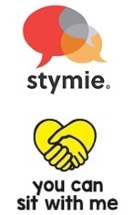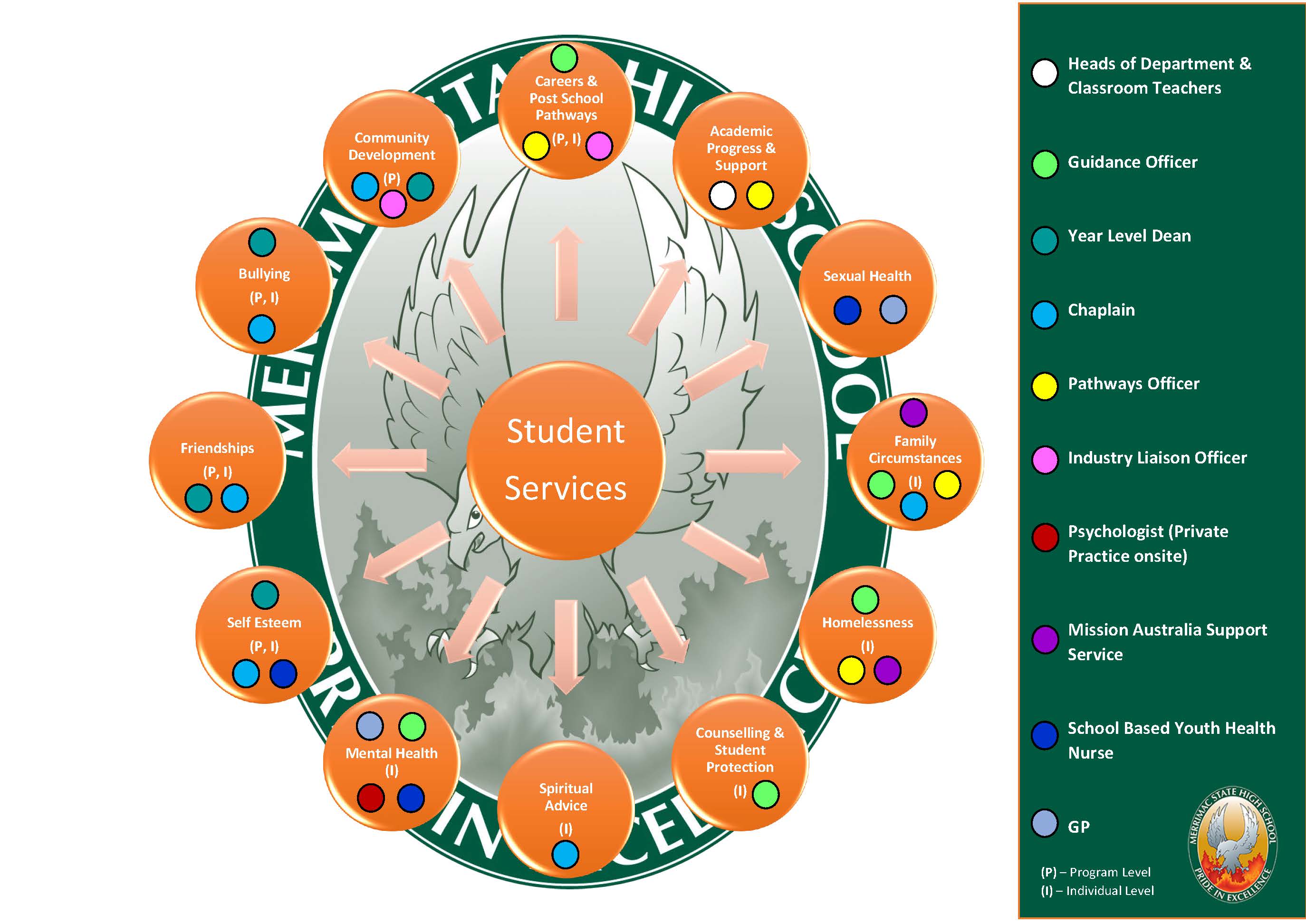Wellbeing at Merrimac State High School

Merrimac State High School prioritises student wellbeing which is reflected through the appointment of a Head of Department for Student Leadership & Wellbeing, and year level Deans whose primary role is to support our students' social and emotional needs. Our 'Merrimac Minds Matter' wellbeing program aims to develop protective factors amongst our students through the promotion, prevention and early intervention of mental health.
Each week students participate in our timetabled wellbeing program 'Merrimac Minds Matter' (Triple M). These lessons, developed by our Head of Department for Student Leadership & Wellbeing and Deans and in conjunction with the student diaries, engage young people in relevant and meaningful discussions with Phoenix teachers to build relationships, developed resilience and mindfulness.
This diary contains 'wellbeing builders' to guide frequent classroom conversations around personal character strengths, goal setting, time management, health and wellbeing.
Our 'Triple M' wellbeing program aims to support, empower and connect all students to ensure their every success in and beyond schooling years.
|
Personal health - Health issues affecting progress, sexual and drug related inquiries, general health and nutrition | Nurse, Guidance Officer |
|
Counselling - Personnel concerns affecting progress, self-harm, student protection | Guidance Officer |
|
Spiritual advice - Greif and loss | Chaplain |
|
Self-esteem - Anxiety, feelings of worthlessness, self-harm, mood swings | Deans, Chaplain, Guidance Officer |
|
Bullying - Harassment and ongoing bullying concerns (physical, emotional and cyberbullying) | Deans |
|
Friendship issues - Friendship breakdowns and rebuilding of friendships | Deans, Chaplain |
|
Career advice - University, VET and Cert inquiries, future planning | Guidance Officer, Industry Liaison Officer, Pathways Officer |
|
Family circumstances - Homelessness, independent living arrangements, change of living circumstances | Guidance Officer, Chaplain |
What is bullying?
Bullying is typically repeated and intentional hurt inflicted on someone by words or actions of another person or group to exert power. Parents and the school working in partnership will have the most significant impact on reducing bullying or harassment.
Policy
Bullying can take many forms:
- Verbal
- Name calling or persistent teasing
- Ridiculing another person’s appearance, physique or actions
- Physical
- Pushing, poking, shoving, spitting
- Deliberately damaging property
- Indirect
- Spreading rumours, malicious gossip
- Deliberately hiding property
- Ignoring and persistent exclusion from friendship circles, social exclusion
- Cyber
- Deliberate inappropriate use of mobile phone, text messaging and internet communications.
These actions demonstrate there has been a breakdown in relationship between students.
What is not bullying?
One-off occurrences of punching, fighting, theft; and/or name calling are not bullying.
These one-off incidents do not represent a break‐down in relationship between two students. This type of behaviour will be dealt with under the school’s behaviour management plan.
Minimising bullying
Numerous activities are undertaken to develop strong friendly relationships between students. Some of these include:
- a strong transition program from primary to high school
- Focused Merrimac Minds Matter Lessons around self-esteem, relationship development and anti‐bullying programs
- student mentor program
- student council promoting positive bystander behaviour
- cross age extra‐curricular activities including You Can Sit With Me
- HOD Student Wellbeing and Leadership, Deans and Chaplain working with smaller cohorts of students
- special support programs for improving low self-esteem and socialization skills, including Shine for Life and A2B program
- undertaking annual surveys of students regard their bullying concerns and wellbeing
- using the data from the National Safe School Framework survey to inform improvements in practice.
When bullying occurs, what should be done? Unforeseen inconvenience
By the students:
- Initially use appropriate responses to solve the problem (e.g. walk away)
- Seek intervention by reporting bullying to a teacher, Dean or parent
- Demonstrate positive bystander behaviour and tell a teacher, Dean or parent if they see another student being bullied
- Make an anonymous report using Stymie on behalf of the person being bullied or harmed
- Never ignore the situation
By the parent:
- Model appropriate behaviour at all times
- Support the school’s philosophy
- Watch for signs of your child being bullied
- Encourage your child to adopt the anti‐bullying strategies taught at school
- Instruct your child to immediately tell a teacher or Dean if they are bullied
- Inform the school immediately of any suspected bullying
By teachers:
- Model appropriate behaviour at all times
- Reassure the individual that bullying is unacceptable. Listen to the student and ask what you can do to help
- Use shared concern intervention tool as appropriate
- Provide advice, intervene and monitor
- Record all reported incidents on OneSchool, and make a referral to the appropriate Dean
Stymie
Merrimac State High School is a Bullying No Way! School that prioritises student wellbeing and safety.
Aligning with our wellbeing framework and to support the student services team, Merrimac SHS students can access Stymie, which allows them to send anonymous notifications about someone who they believe is being bullied or harmed. Allowing them as bystanders to remain anonymous, gives them the courage to overcome the fears and social pressures that prevent them from speaking up. It also relieves feelings of helplessness for students who want to help their peers but don’t quite know how.
Ultimately, Stymie helps our school community foster caring and respectful relationships. Notifications can be made through the web based app at
Stymie website.
View full image (JPG, 171KB)
